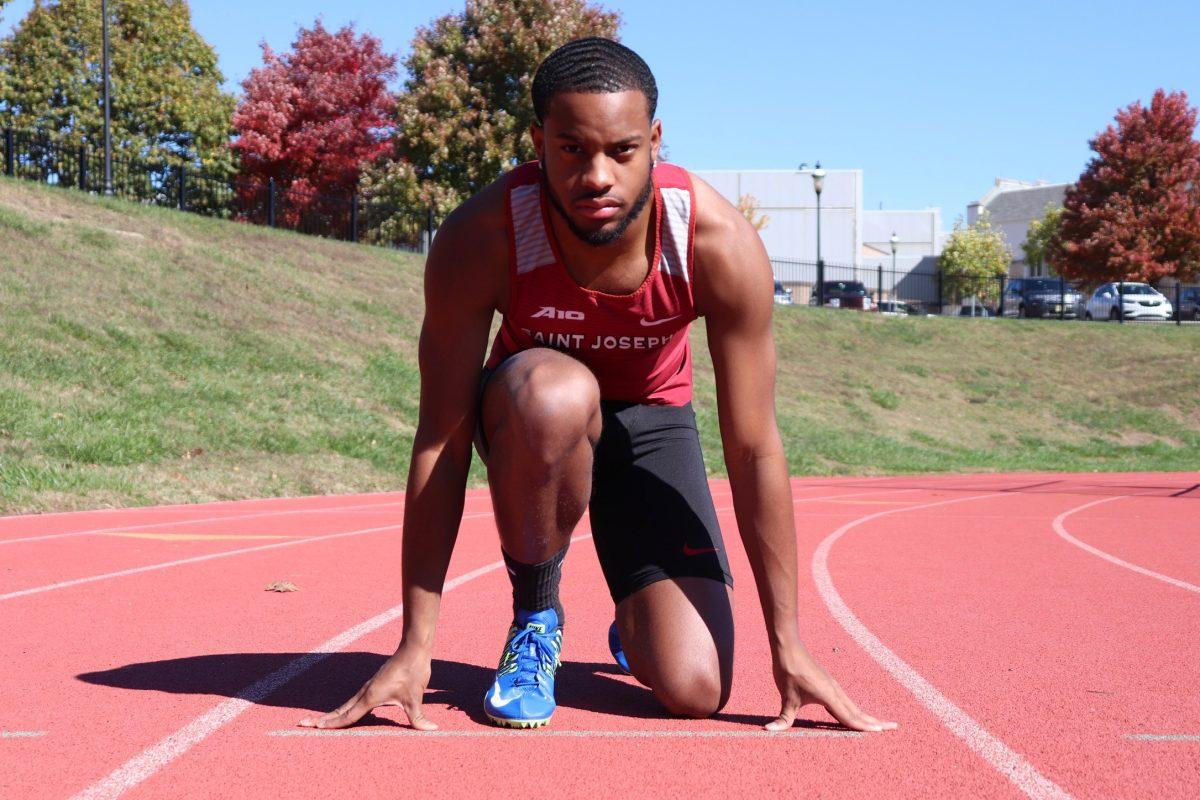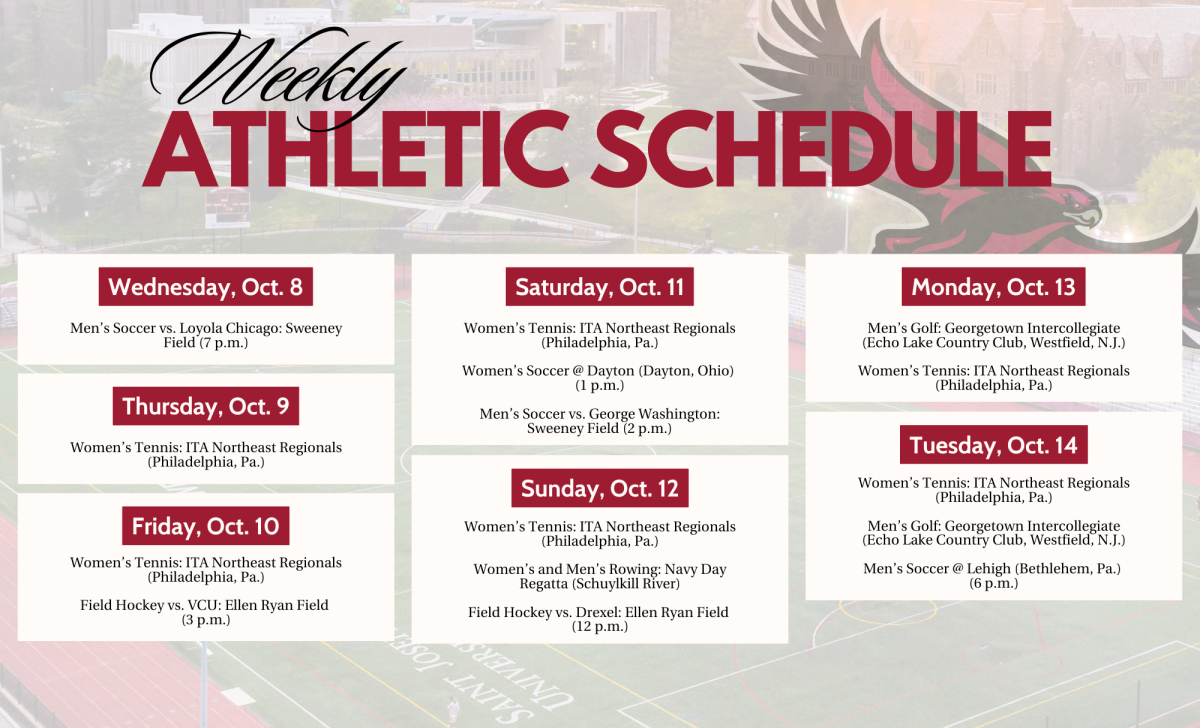Since his sophomore year, Trae’ Robinson ’20, co-captain of the St. Joe’s men’s track and field team, kept his head down, eyes focused intently on his phone, as he hurried through the hallways of the sports arena en route to the locker room.
Once in the locker room of Michael J. Hagan ’85 Arena, Robinson quickly prepared for practice, and always did his best to leave immediately after, without speaking to anyone. All the while he remained connected to his phone so he could block out what he calls “the noise.”
“I always try to have my [headphones] on as well,” Robinson said. “I use them to block out the noise. They say things that just shouldn’t be said.”
Robinson, who has been openly gay since freshman year, has worked diligently during his time as an athlete at St. Joe’s to ignore the homophobic comments he said he has heard in the men’s locker rooms and other areas of Hagan Arena. Robinson said they were not directed at him specifically, but he did his best to avoid being near or interacting with athletes who used homophobic language.
The experiences of being exposed to homophobia during his four years as a collegiate athlete prompted Robinson to talk for a few minutes in a video on his YouTube channel about the impact of these comments. In the publicly available video titled “Struggling as a D1 Track Athlete,” which Robinson posted on Feb. 19, he spoke about how he found it difficult to talk to his teammates about their homophobic remarks, even though he was one of the captains.
“I don’t want to continuously be hurt by language that is being used, that shouldn’t be used,” Robinson said. “They just don’t know the things that I’ve felt the past couple of years.”
According to Robinson, homophobic comments in Hagan Arena’s public and private spaces ranged from “casual” to “aggressive,” all occurring in athletes’ interactions with each other.
One day, during the fall of his freshman year, Robinson recalled an interaction when he happened to be walking through a common locker room area in the arena. He observed a lacrosse player snatch a towel from a teammate who had just stepped out of the shower. Other members of the lacrosse team were also in the locker room. Robinson said he did not have his headphones on, so he heard the player whose towel was snatched shout back at the towel-snatcher.
“This person yelled at the top if his lungs, ‘What do I look like, a fucking faggot? I don’t like this shit. Stop treating me like a fag,’” Robinson said the player shouted.
“It’s just disrespect,” Robinson said. “It’s coming from a place of hate. I know 100% if a person uses the word ‘fag,’ it’s coming from a place of hate.”
This use of homophobic language is regarded as a form of “locker room talk,” according to Elizabeth Jeglic, Ph.D., a professor of psychology at John Jay College and an expert who has researched and written on the topic. She said “locker room talk” is in this case, homophobic language that is said in private among peers or players of the same sex. She said that while “locker room talk” terminology is largely used in jest, these comments are emblematic of underlying belief systems.
“If you were to challenge someone, they might say, ‘It was a joke,’” Jeglic said. “But if there wasn’t some truth to it, it wouldn’t even be a joke. You wouldn’t say it at all. It is harmful, and part of changing the culture is calling people out. By doing that, we will eventually change the culture, but it will take time.”
Robinson said he has experienced the hurt caused by “casual remarks.” He remembered a time he was speaking to a high school recruit outside the men’s locker rooms when he heard a conversation among a group of athletes inside the room.
‘“Yeah that’s so gay, bro, what the fuck? Are you fucking kidding me? Why are they so gay?’” Robinson said players remarked. “This type of terminology has been embedded in them for so long that they just spew these words into the atmosphere without even catching themselves.”
Jill Bodensteiner, J.D., director of athletics, said homophobia has no place in any St. Joe’s department. She said SJU Athletics needs to be intentional about implementing an action plan in the fall to address these issues.
“I can’t say strongly enough how abhorrent I find this behavior,” Bodensteiner said. “It is totally inconsistent with our departmental values, our university values and certainly my personal values.”
Robinson said in the first three years of his college career, he was worried about speaking out about his views on the homophobic culture of “locker room talk.” He did not want to make St. Joe’s look bad.
However, by his senior year, Robinson had changed his mind.
“Enough is enough,” Robinson said. “I told myself, ‘Why are you caring so much for people who clearly don’t care for you?’ I want to be the person to speak up, to help others and not be scared. I want to be that voice.”
And this led to him speaking out through his YouTube video, now viewed 918 times at the time of publication since he published the video in February.

Aliyah Stokes ’20, who is Robinson’s closest friend on campus and a member of the St. Joe’s women’s track team, said she has had many conversations with Robinson about homophobia in St. Joe’s athletics. She said a lot of athletes might not have any known personal ties with anyone in the LGBTQIA+ community and therefore don’t understand the effect that their comments have on people.
“[Homophobic comments] have become mainstream, and people don’t think it’s bad,” Stokes said. “Some of his teammates would make comments not understanding how inappropriate they are.”
Robinson said during his freshman year, these homophobic comments affected him the most out of his four years, and there was a constant debate in his head as to whether he should speak up and say something to the coach. He decided not to because he didn’t want to disrupt the existing team dynamic.
“You don’t want to be seen as the person doing this, or speaking up on this when everybody else thinks it’s cool,” Robinson said. “I would just keep my mouth shut.”
Head Coach Mike Glavin said Robinson did not discuss any homophobic comments with him. While Glavin said he is unaware of any issues about homophobia in SJU Athletics, he takes these allegations seriously.
“Nobody needs to feel uncomfortable or out of place in a place they were invited to be,” Glavin said. “It’s completely inconsistent not only with Jesuit philosophy, but it’s inconsistent with how people should act in 2020.”
Jeglic said athletes sometimes fear speaking out because by doing so, it will break hypermasculine norms, which oftentimes include homophobia.
“If someone voices that this is not okay, they will be viewed as in support of gay attitudes or anti-masculine attitudes, and they are then not part of the team,” Jeglic said.
Robinson said he wants people to know that homophobic comments have had a lasting impact on him. In his Youtube video however, Robinson thanked his team, saying “I definitely do love them” and said he wanted to lead by example.
“I don’t think the comments are [always] coming from a place of hate,” Robinson said in the video. “They’re just not things that people should be saying.”
But with homophobic language piling up over a four-year period, Robinson can’t forget what has been said. He said these comments are never just left in the past.
“I will always remember,” Robinson said.
















































